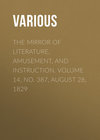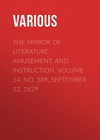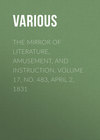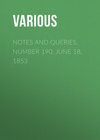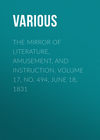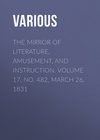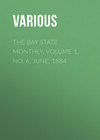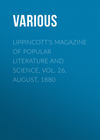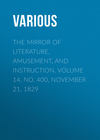Czytaj książkę: «The Mirror of Literature, Amusement, and Instruction. Volume 14, No. 387, August 28, 1829», strona 4
OLD POETS
LOVE
What thing is Love, which naught can countervail?
Naught save itself, ev'n such a thing is Love.
And worldly wealth in worth as far doth fail,
As lowest earth doth yield to heav'n above.
Divine is love, and scorneth worldly pelf,
And can be bought with nothing but with self.
SIR W. RALEIGH.
If Love be life, I long to die,
Live they that list for me:
And he that gains the most thereby,
A fool at least shall be.
But he that feels the sorest fits
'Scapes with no less than loss of wits.
Unhappy life they gain,
Which love do entertain.
SIR W. RALEIGH.
If all the world and Love were young,
And truth in every shepherd's tongue,
These pleasures might my passion move,
To live with thee, and be my love.
But fading flowers in every field,
To winter floods their treasures yield;
A honey'd tongue, a heart of gall,
Is fancy's spring, but sorrow's fall.
SIR W. RALEIGH.—Answer to Marlowe's "Come Live," &c.
Passions are likened best to floods and streams;
The shallow murmur, but the deep are dumb,
So, when affections yield discourse, it seems
The bottom is but shallow whence they come:
They that are rich in words must needs discover
They are but poor in that which makes a lover.
SIR W. RALEIGH.
—– Love is nature's second sun
Causing a spring of virtues where he shines.
And, as without the sun, the world's great eye,
All colours, beauties, both of art and nature,
Are giv'n in vain to men; so, without love
All beauties bred in woman are in vain,
All virtues born in men lie buried;
For love informs them as the sun doth colours.
And as the sun reflecting his warm beams
Against the earth, begets all fruits and flowers,
So love, fair shining in the inward man,
Brings forth in him the honourable fruits
Of valour, wit, virtue, and haughty thoughts,
Brave resolution, and divine discourse.
O! 'tis the paradise! the heaven of earth!
CHAPMAN.
Ladies, though to your conquering eyes
Love owes its chiefest victories,
And borrows those bright arms from you
With which he does the world subdue;
Yet you yourselves are not above
The empire nor the griefs of love.
Then wrack not lovers with disdain,
Lest love on you revenge their pain;
You are not free, because you're fair,
The boy did not his mother spare:
Though beauty be a killing dart,
It is no armour for the heart.
ETHERIDGE.
Come, little infant, love me now.
While thine unsuspected years
Clear thine aged father's brow
From cold jealousy and fears.
Pretty, surely, 'twere to see
By young Love old Time beguil'd;
While our sportings are as free
As the muse's with the child.
Now then, love me; Time may take
Thee before my time away;
Of this need we'll virtue make
And learn love before we may.
So we win of doubtful fate;
And if good to us she meant,
We that good shall antedate.
Or, if ill, that ill prevent.
MARVELL.
Hear ye virgins, and I'll teach,
What the times of old did preach:
Rosamond was in a tower
Kept, as Danae, in a tower;
But yet love, who subtle is,
Crept to that, and came to this:
Be ye lock'd up like to these,
Or the rich Hesperides:
Or those babies in your eyes,
In their crystal nurseries;
Notwithstanding love will win,
Or else force a passage in;
And as coy be as you can.
Gifts will get ye, or the man.
HERRICK.
Great Venus, queen of beauty and of grace.
The joy of gods and men, that under sky
Dost fairest shine, and most adorn thy place,
That with thy smiling look dost pacify
The raging seas, and mak'st the storms to fly:
Thee, goddess, thee the winds, the clouds do fear,
And when thou spreadst thy mantle forth on high,
The waters play, and pleasant lands appear,
And heaven laughs, and all the world shows joyous chear.
—All the world by thee at first was made,
And daily yet thou dost the same repair,
Ne ought on earth that merry is and glad,
Ne ought on earth that lovely is and fair,
But thou the same for pleasure didst prepare.
Thou art the root of all that joyous is,
Great God of men and women, queen of th' air,
Mother of laughter, and well-spring of bliss,
O graunt that of my love at last I may not miss.
Fairy Queen.—SPENSER.
As men tormented with a burning fever,
Dream that with drink they 'suage their grievous thirst,
But when they wake they find their thirst persever,
And to be greater than it was at first;
So she whose thoughts from love sleep could not sever,
Dreamt of that thing for which she 'wake did thirst;
But waking, felt and found it as before,
Her hope still less, and her desire still more.
SIR J. HARRINGTON.
—– Love is only root and crop of care,
The body's foe, the heart's annoy and cause of pleasures rare
The sickness of the mind and fountain of unrest,
The gulf of guile, the pit of pain, of grief the hollow chest;
A fiery frost, a flame that frozen is with ice,
A heavy burden light to bear, a virtue fraught with vice;
It is a worldlike peace, a safety seeing dread,
A deep despair annexed to hope, a fancy that is fed,
Sweet poison for his taste, a port Charybdis like,
A Scylla for his safety, though a lion that is meek.
TURBERVILLE.
KISSING
O kiss! which dost those ruddy gems impart,
Or gems, or fruits, of new found Paradise;
Breathing all bliss and sweet'ning to the heart;
Teaching dumb lips a nobler exercise.
O kiss! which souls, ev'n souls, together ties
By links of love, and only nature's art;
How fain would I paint thee to all men's eyes.
Or of thy gifts, at least, shade out some part.
But she forbids, with blushing words, she says,
She builds her fame on higher-seated praise;
But my heart burns, I cannot silent be.
Then since (dear life,) you fain would have me peace,
And I mad with delight want wit to cease,
Stop you my mouth, with still, still kissing me.
SIR P. SIDNEY.
HEALTH
The common ingredients of health and long life are
Great temp'rance, open air,
Easy labour, little care.
IBID.
SPIRIT OF THE PUBLIC JOURNALS
ARRIVAL AT MARGATE
From "The Monthly Club" of Sharpe's London Magazine
The buildings of Margate now became evident, and every minute developed some new feature in the landscape; all the party abandoned their sitting to enjoy the view. The curved pier painted pea green and covered with Cockneys, now was disclosed to our eyes, and my old friend from Leicester was again staggered into a profound silence, by being told that a row of houses with a windmill at the end of it, was Buenos Ayres. I saw his amazement, but he did not betray his ignorance in speech as the French actress did, who was in London some years since, and when dining on the Adelphi Terrace was shown Waterloo Bridge. After gazing at it, with a degree of pathos, partly national and partly theatrical, she heaved a sigh for the brave fellows who had perished in the neighbourhood, and feelingly inquired whereabouts the farm of Haye Saint was—this is literally a fact and is vouched for—nor is the absence of geographical knowledge in the natives of France, confined to the lady—she is by no means a solitary instance of the most glorious ignorance of localities.—The Turks too, talk of Ireland as a disorderly part of London; and an American, during the last winter, lecturing in Germany, referring to the great improvements which have recently taken place in England, enumerated, amongst other stupendous works of art, the Menai Bridge, which he informed his hearers united IRELAND with WALES.
As we approached the harbour we seemed to fly—the jetty and pier became more and more crowded—it was evident we had created "an interest;" the hurry and bustle on board appeared to increase as we neared the shore, and the sudden tranquillization of the hubbub by the magical words, "stop her," of the master evidently excited a mingled feeling of wonder and satisfaction in the breast of our Leicestershire companion, whose countenance had previously indicated a strong suspicion that it was the captain's intention to try the relative strength of our vessel's bow and the nob end of Mr. Jarvis's jetty.
I never shall forget his delight as we tranquilly glided to the side of the landing-place, nor his violent indignation when stepping out of the boat in a pair of jockey boots, and selecting, what appeared to his ruralized vision, a verdant spot; his feet slid from under him, and he got a fall unmodified in its disagreeable results by the excitement of the sport so prevalent in his native country.
"Who built this fine stone affair?" said R–, pointing to the pea-green promenade on our right.
"The people of Margate," said some one.
"I thought nobody in England but the king could make a pier," said R–.
"Come, come," cried B–, "let us be grave for a minute or two; we look more like a parcel of boys landing than a grave and learned body."
"Youth is the time for punning," said R–.
"It is no great crime when one is older," said B–.
"That I deny," answered our wag; "it may be good in youth, but it is bad in age."
The groan which followed this last pun of the voyage reechoed along the shore, and it was not until we reached Howe's hotel, a sort of Bath York House stuck in the middle of Golden Square, London, that the tumult died away.
THE UNICORN
In the physical world, some of our secrets are disappearing; and though Captain Parry failed to find out the pole, and we believe, with that worthy navigator, that the world have been dreaming from the beginning, and that there is no pole; and though Captain Ross will go further and fare worse, yet things are turning up now and then that our most benevolent scepticism cannot resist. But among other plunders of the imagination, they are going to rob us of the unicorn. For two thousand years and upwards, a short date in the history of human quarrel about nothings, the sages of this world have been doubting and deciding on the existence of this showy creature. Pliny would have sworn to his having all but seen it, and he would have sworn that too, if any one had taken the trouble to ask him. Kircher, and a few of the German naturalists, and black-letter fools—every naturalist and black-letter man being more or less a fool—dug up the question out of the pit of Teutonic dulness, and ever since, every traveller beyond the Needles, has had his theory, which was quite as good as his fact, and his fact, which was quite as good as his theory.
The topic perished in Germany, being stifled under professor Bopp and Sanscrit, Professor Semler and Scepticism, Professor Jahn and Jacobinism, and the whole vast feather-bed suffocation of Professor Kotzebue and Comedy. But in England it was endeared to us by associations "deep in every truly British heart," as the chairmen of our tavern parties say over their third bottle. We had seen it for ages gallantly climbing the slippery heights of the kingly crown on show boards, carriages, transparencies, theatres, and the new, matchless, hydropyric, or fiery and watery fairy palace of Vauxhall. It met us in every material, from the gilt confitures of Bartholomew fair, to the gold plateau of the "table laid for sixty," at St. James's. All the dilettanti were immersed in the great national question of its shape and features. Mr. Barrow, in a journey of exploration, which extended to three miles beyond the Cape, believed that he saw it, but strongly doubted its existence. M. Vaillant never saw it, nor believed that any one ever did, but was as sure of its existence as if it had slept in his bosom, and been unto him as a daughter. Mr. Russel had one, which he milked twice a day, and drove in a curricle to visit the Queen of Madagascar. Doctor Lyall is writing a quarto from Madagascar, to deny the statement in toto; admitting, however, that there is a rumour of the being of some nondescript of the kind in the mountains, somewhat between the size of the elephant and the Shetland pony; but that he and we think the subject-matter will turn out asinine. But now a Mr. Ruppell, after a long sojourn in the north-east of Africa, comes at once to cheer and dishearten us by the discovery, that in Kordofan, if any one knows where that is, the unicorn exists; stated to be of the size of a small horse, of the slender make of the gazelle, and furnished with a long, straight, slender horn in the male, which was wanting in the female. According to the statements made by various persons, it inhabits the deserts to the south of Kordofan, is uncommonly fleet, and comes only occasionally to the Koldagi Heive mountains on the borders of Kordofan. This, it must be acknowledged, is a sad falling off from the rival of the lion, that we have honoured so long in the arms of England. But we sincerely hope, that by the next arrival, it will not degenerate into a cow, or worse, a goat. But he tells us, that to our knowledge of the giraffe he has added considerably. He obtained in Nubia and Kordofan five specimens, two of which were males and three females. He regards the horns as constituting the principal generic character, they being formed by distinct bones, united to the frontal and parietal bones by a very obvious suture, and having throughout the same structure with the other bones. In both sexes one of these abnormal bones is situated on each branch of the coronal suture, and the male possesses an additional one placed more anteriorly, and occupying the middle of the frontal suture. The anomalous position of this appendage furnishes a complete refutation of the theory of Camper with regard to the unicorn, that such an occurrence was contrary to nature, and proves at least the possibility of the existence of such an animal. Professor Camper is an ass, of course; but when are we to expect any thing better from the illustrissimi of the land of sour-krout? Give a Doctor Magnificus his due allowance of the worst tobacco, and the worst beer in the world, with a ream of half-brown paper, and a Leipsic catalogue to plunder, and he will in three months write any subject dead—smother the plainest truth with an accumulation of absurdity, astonishing, as the work of a creature with but two hands—and prove that the earth is but a huge oyster, in which Germany is the pearl; or that man is only a reclaimed baboon, of which all the wit is centered in Weimar.
Monthly Magazine.
